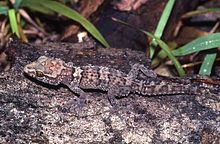Ibity ground gecko
| Ibity ground gecko | |
|---|---|

| |
| Scientific classification | |
| Domain: | Eukaryota |
| Kingdom: | Animalia |
| Phylum: | Chordata |
| Class: | Reptilia |
| Order: | Squamata |
| Infraorder: | Gekkota |
| Family: | Gekkonidae |
| Genus: | Paroedura |
| Species: | P. ibityensis
|
| Binomial name | |
| Paroedura ibityensis Rösler & Krüger, 1998
| |

| |
| Range of the species within the Paroedura bastardi clade, with P. ibityensis indicated by the purple decagrams | |
| Synonyms | |
| |
The Ibity ground gecko (Paroedura ibityensis) is a species of lizard in the family Gekkonidae. Though initially described in 1998 as a subspecies of the Mocquard's Madagascar ground gecko, it has been recognized as a distinct species within the species complex since 2008. It is endemic to Ibity and Itremo in the Central Highlands of Madagascar, and is named after Mount Ibity where it was first discovered.
This species reaches a snout–vent length of just over 6 cm and has enlarged keeled scales. While not currently deemed an endangered species, it has a limited and specialized habitat which could be easily impacted the climate change in the future.
Taxonomy
[edit]
The Ibity ground gecko was first described in 1998 by Rösler & Krüger under the scientific name Paroedura bastardi ibityensis, with the authors believing it to be a subspecies of the Mocquard's Madagascar ground gecko (Paroedura bastardi).[2] However, later studies would find that it differs both morphologically and genetically from the nominate form of Paroedura bastardi, and it has been recognized as a separate species since 2008, now known as Paroedura ibityensis. The specific name refers to Mount Ibity, the type locality.[3]
The following cladogram shows the position of P. ibityensis among its closest relatives according to Piccoli et al. (2023):[4]
| |||||||
Distribution and habitat
[edit]
The Ibity ground gecko is endemic to the Central Highlands of Madagascar, and is only known from the localities of Ibity and Itremo. It has been observed from 1,600 m above sea level, and may range to over 2,000 m to the tops of the massifs.[1] This montane species inhabits rocky crevices in highland savannahs, such as those in cliffs or mountain peaks.[5] While other species of the Paroedura bastardi species complex are known to coexist with each other, the Ibity ground gecko is not known to occur in sympatry with its relatives in this highland habitat.[6]
Description
[edit]
This species is a moderately-sized gecko, with a maximum snout–vent length of 61 mm. Like other members of the Paroedura bastardi clade, the Ibity ground gecko has prominent longitudinal rows of enlarged keeled scales on its dorsal surface, including on the limbs and tail. The digits end with widened toe pads which help the animal in climbing low tree trunks and rock surfaces. The body is grey or light brown, with light crossbands that are most prominent in juveniles.[6]
Conservation
[edit]Although the Ibity ground gecko remains common in rocky outcrops within its range and its population is presumed stable, the species has been listed as Near Threatened by the IUCN due to its narrow extent of occurrence, being known from only two localities. Mining for granite may pose a potential threat, though plans to do so within the range of this reptile do not currently exist.[1] Future impacts from climate change may alter the specialized montane habitat of this lizard, with the warming climate causing upslope displacement of the population.[7]
Though the species itself has not been the subject of conservative measures, both its known localities (Ibity and Itremo) are protected areas subject to conservation. Ecological restoration projects and ongoing efforts to reduce fire frequency have been involved in the initiative to protect these areas.[8]
References
[edit]- ^ a b c Raxworthy, C.J.; Ratsoavina, F.; Rabibisoa, N.; Rakotondrazafy, N.A.; Bora, P. (2011). "Paroedura ibityensis". IUCN Red List of Threatened Species. 2011: e.T172985A6953139. doi:10.2305/IUCN.UK.2011-2.RLTS.T172985A6953139.en. Retrieved 18 November 2021.
- ^ Rösler, Herbert; Krüger, Jens (1998). "Eine neue Unterart von Paroedura bastardi (Mocquard, 1900) (Sauria: Gekkonidae) aus dem zentralen Hochland von Madagascar". Sauria. 20 (2): 37–46.
- ^ Jackman, Todd R.; Bauer, Aaron M.; Greenbaum, Eli; Glaw, Frank; Vences, Miguel (2008-01-01). "Molecular phylogenetic relationships among species of the Malagasy-Comoran gecko genus Paroedura (Squamata: Gekkonidae)". Molecular Phylogenetics and Evolution. 46 (1): 74–81. doi:10.1016/j.ympev.2007.10.018. ISSN 1055-7903. PMID 18077188.
- ^ Piccoli, Costanza; Belluardo, Francesco; Lobón-Rovira, Javier; Alves, Ivo Oliveira; Rasoazanany, Malalatiana; Andreone, Franco; Rosa, Gonçalo M.; Crottini, Angelica (2023-04-10). "Another step through the crux: a new microendemic rock-dwelling Paroedura (Squamata, Gekkonidae) from south-central Madagascar". ZooKeys (1181): 125–154. doi:10.3897/zookeys.1181.108134. ISSN 1313-2970. PMC 10568478. PMID 37841030.
- ^ Glaw, Frank; Vences, Miguel (2007). A field guide to the amphibians and reptiles of Madagascar (3rd ed.). Köln: Vences & Glaw. ISBN 978-3-929449-03-7.
- ^ a b Miralles, Aurélien; Bruy, Teddy; Crottini, Angelica; Rakotoarison, Andolalao; Ratsoavina, Fanomezana M.; Scherz, Mark D.; Schmidt, Robin; Köhler, Jörn; Glaw, Frank; Vences, Miguel (2021-02-26). "Completing a taxonomic puzzle: integrative review of geckos of the Paroedura bastardi species complex (Squamata, Gekkonidae)". Vertebrate Zoology. 71: 27–48. doi:10.3897/vz.71.e59495. ISSN 2625-8498.
- ^ Raxworthy, Christopher J.; Pearson, Richard G.; Rabibisoa, Nirhy; Rakotondrazafy, Andry M.; Ramanamanjato, Jean‐Baptiste; Raselimanana, Achille P.; Wu, Shenghai; Nussbaum, Ronald A.; Stone, DáIthí A. (2008-07-08). "Extinction vulnerability of tropical montane endemism from warming and upslope displacement: a preliminary appraisal for the highest massif in Madagascar". Global Change Biology. 14 (8): 1703–1720. Bibcode:2008GCBio..14.1703R. doi:10.1111/j.1365-2486.2008.01596.x. ISSN 1354-1013. PMC 3597264.
- ^ Alvarado, Swanni T.; Buisson, Elise; Carrière, Stéphanie M.; Rabarison, Harison; Rajeriarison, Charlotte; Andrianjafy, Mamisoa; Randriatsivery, Fleuria M.; Rasoafaranaivo, Margiane H.; Raharimampionona, Jeannie; Lowry, Porter P.; Birkinshaw, Chris (2015-06-01). "Achieving Sustainable Conservation in Madagascar: The Case of the Newly Established Ibity Mountain Protected Area". Tropical Conservation Science. 8 (2): 367–395. doi:10.1177/194008291500800207. hdl:11449/158672. ISSN 1940-0829. S2CID 53580981.

